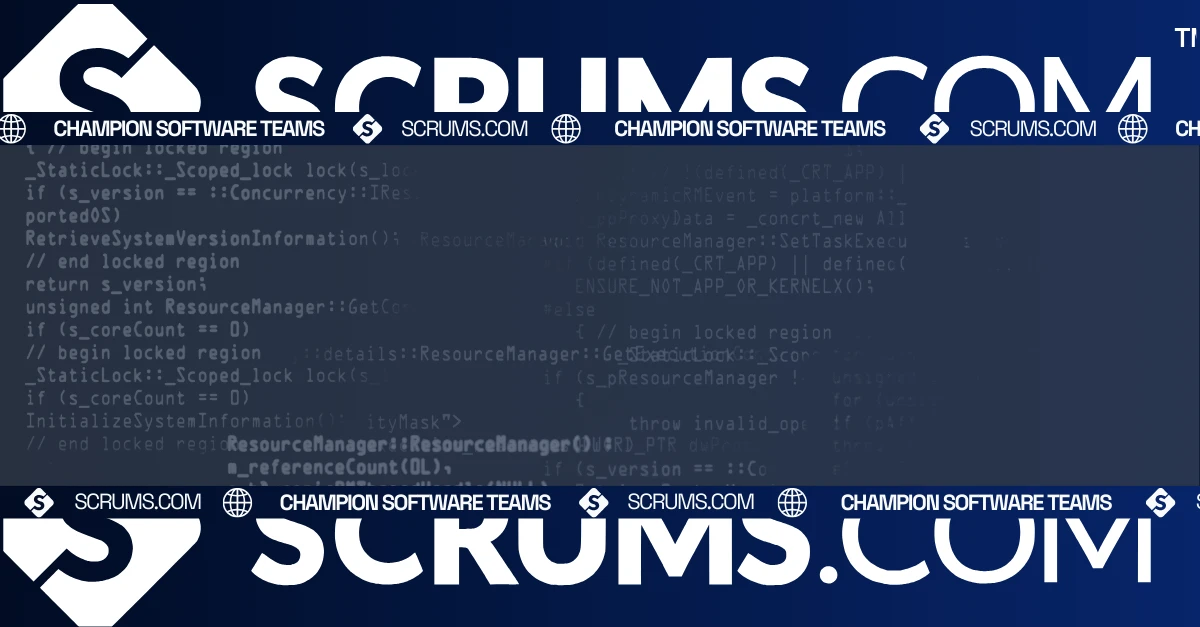Hire Apache Kafka software developers
Scrums.com's 8,500+ software developer talent pool includes experts across a wide array of software development languages and technologies giving your business the ability to hire in as little as 21-days.
Trusted by 400+ global companies
















What is Apache Kafka and Why It Matters for Your Business
Apache Kafka is a distributed streaming platform that enables real-time data pipelines and event streaming applications. Originally developed by LinkedIn and later open-sourced, Kafka has become a key technology for managing real-time data streams, distributed systems, and event-driven architectures. According to a 2023 Confluent survey, over 80% of Fortune 100 companies are leveraging Apache Kafka for their data streaming needs, making it a critical tool for businesses seeking to harness the power of real-time data.
Hiring an Apache Kafka developer is essential for businesses looking to build robust, scalable, and high-performance data streaming and messaging systems. From real-time analytics to data processing pipelines, Kafka developers provide the expertise needed to optimize data flow and drive business insights.
Key Benefits of Hiring a Kafka Developer
Hiring a Kafka developer offers numerous advantages, especially for businesses focused on building scalable, reliable, and real-time data streaming solutions. Here are some key benefits:
- Real-Time Data Streaming and Processing: Kafka developers can design and implement real-time data pipelines that enable businesses to process and analyze data as it arrives. This is essential for applications like fraud detection, recommendation engines, and real-time analytics.
- High Throughput and Low Latency: Kafka is designed to handle large volumes of data with low latency, ensuring that data flows smoothly through various systems. Skilled Kafka developers can optimize configurations to maximize throughput, providing a seamless experience for data-intensive applications.
- Scalable and Distributed Architecture: Kafka’s distributed architecture allows it to scale horizontally, making it ideal for businesses with growing data needs. A Kafka developer can set up and manage Kafka clusters that efficiently handle millions of messages per second.
- Fault Tolerance and Reliability: Kafka is built to be fault-tolerant, ensuring that data is not lost even in the event of a system failure. Kafka developers can configure replication and partitioning strategies to provide a robust and reliable messaging system.
- Seamless Integration with Big Data and Cloud Platforms: Kafka integrates seamlessly with popular big data and cloud platforms like Hadoop, Spark, AWS, and Google Cloud. A skilled Kafka developer can connect Kafka to various data sources and sinks, enabling efficient data flow across the entire technology stack.
Core Competencies of a Skilled Kafka Developer
When hiring a Kafka developer, it’s crucial to ensure they possess the necessary skills and expertise to build and optimize efficient data streaming and messaging systems. Key competencies include:
- Proficiency in Apache Kafka Ecosystem: A skilled Kafka developer should have a deep understanding of the Kafka ecosystem, including Kafka Streams, Kafka Connect, and Kafka Topics. They should be able to design and implement scalable Kafka clusters that meet your specific data processing needs.
- Experience with Real-Time Data Processing Frameworks: Kafka developers should be familiar with real-time data processing frameworks like Apache Flink, Apache Spark, and Apache Storm. This expertise allows them to build complex data processing pipelines that handle high-velocity data streams.
- Knowledge of Distributed Systems and Event-Driven Architecture: A competent Kafka developer should have experience in designing distributed systems and event-driven architectures. This includes understanding concepts like partitioning, replication, and stream processing to build scalable and resilient applications.
- Expertise in Security and Compliance: Kafka developers must be aware of security best practices, such as securing data in transit and at rest, managing access control, and ensuring compliance with industry standards like GDPR and HIPAA. This is crucial for maintaining data integrity and protecting sensitive information.
- Testing and Monitoring Skills: A good Kafka developer should be skilled in using monitoring tools like Prometheus, Grafana, and CMAK to track performance and identify bottlenecks. They should also be proficient in testing Kafka applications to ensure reliability and stability under different workloads.
How Apache Kafka is Used in Modern Data-Driven Applications
Apache Kafka is increasingly being adopted in modern data-driven applications due to its high throughput, scalability, and fault tolerance. Here are some common applications of Apache Kafka:
- Real-Time Data Analytics: Kafka is widely used for real-time data analytics, where businesses need to process and analyze data as it arrives. Companies like Netflix, LinkedIn, and Uber use Kafka to power real-time analytics platforms that provide actionable insights in milliseconds.
- Event-Driven Microservices: Kafka is an excellent choice for event-driven microservices architecture, where services communicate through events rather than direct calls. Kafka’s ability to handle large volumes of events and its high fault tolerance make it ideal for this architecture.
- Data Integration and ETL Pipelines: Kafka is often used to build data integration and ETL (Extract, Transform, Load) pipelines that move data between different systems. Its ability to handle both real-time and batch processing allows businesses to create flexible and efficient data pipelines.
- Log Aggregation and Monitoring: Kafka can be used for log aggregation, where logs from various systems are collected, stored, and analyzed in a centralized location. This is valuable for monitoring and debugging distributed systems.
- Scalable Messaging Systems: Kafka is used as a messaging system to handle high-throughput messaging between different parts of an application. Its ability to process millions of messages per second makes it suitable for applications that require high-performance messaging.
Apache Kafka vs. Other Data Streaming Platforms: When to Choose Kafka for Your Project
Choosing the right data streaming platform is critical to the success of your data-driven project. Here’s how Apache Kafka compares to other platforms like Apache Pulsar, RabbitMQ, and Amazon Kinesis, and when it might be the best choice:
- High Throughput and Scalability: Unlike RabbitMQ, which is more suited for low-latency messaging, Kafka is designed to handle large volumes of data with high throughput. This makes Kafka ideal for big data applications that require processing large amounts of data in real-time.
- Robust Fault Tolerance: Kafka’s distributed architecture provides strong fault tolerance with built-in replication and partitioning. Compared to Amazon Kinesis, Kafka offers more flexibility and control over data replication, making it a better choice for mission-critical applications.
- Flexible Data Retention and Replay: Kafka allows data retention for a configurable period, enabling data replay for debugging, auditing, or replaying missed events. This feature sets Kafka apart from platforms like Apache Pulsar, where data retention may require additional setup.
- Wide Ecosystem and Integration Support: Kafka integrates seamlessly with a wide range of data processing frameworks, databases, and cloud platforms. Its strong ecosystem support makes it more adaptable than more specialized platforms like RabbitMQ or Kinesis.
- Extensive Community and Enterprise Support: With a large and active community, Kafka benefits from continuous updates, new features, and extensive support. This robust support network ensures that Kafka remains at the forefront of real-time data streaming technologies.
The Future of Apache Kafka Development: Trends and Insights
Apache Kafka is set to continue its growth as a leading data streaming platform, with several trends highlighting its expanding role in modern applications:
- Adoption of Kafka in Cloud-Native Environments: As more businesses move to cloud-native environments, Kafka is being adopted for real-time data processing in the cloud. Managed Kafka services like Confluent Cloud and Amazon MSK are gaining popularity, providing scalability and ease of management.
- Focus on Event-Driven Architectures: The rise of event-driven architectures is driving the adoption of Kafka, particularly in microservices-based applications. Kafka’s ability to handle large volumes of events and maintain high reliability is making it a preferred choice for these architectures.
- Integration with AI and Machine Learning: Kafka is increasingly being used to build data pipelines that feed AI and machine learning models in real-time. This trend is expected to grow as more businesses leverage real-time data for predictive analytics and decision-making.
- Enhanced Security and Compliance Features: As Kafka adoption grows in industries with strict compliance requirements, there is a focus on enhancing security and compliance features. This includes better encryption, role-based access control, and integration with compliance monitoring tools.
- Expansion into Edge Computing: Kafka is finding its place in edge computing, where low-latency data processing is crucial. Its lightweight nature and ability to handle high-throughput data make it ideal for edge applications in sectors like IoT and telecommunications.
How to Hire the Right Kafka Developer for Your Needs
Finding the right Kafka developer is essential to the success of your real-time data streaming and messaging project. Here’s how to get started:
- Define Your Project Requirements: Clearly outline your project’s scope, technical requirements, and desired features. This will help you identify developers with the right skills and experience.
- Look for Relevant Experience: Choose developers with a proven track record in Kafka development, particularly those who have successfully built and managed data streaming applications similar to yours. Experience with event-driven architectures, real-time analytics, or distributed systems is highly valuable.
- Evaluate Technical Skills: Ensure the developer has strong Kafka coding skills, experience with real-time data processing frameworks, and proficiency in building secure, scalable applications.
- Assess Communication and Collaboration: Effective communication is key to a successful project. Your Kafka developer should be able to articulate ideas clearly and collaborate effectively with your team, especially when building complex, data-driven applications.
- Consider Freelancers or Development Agencies: Depending on the scale of your project, you may opt to hire a freelance developer or work with a development agency specializing in Kafka. Each option has its advantages, so choose based on your project’s needs and budget.
Don't Just Take Our Word for It
Hear from some of our amazing customers who are building with Scrums.com Teams.
Find Related Software Developer Technologies
.NET Core developers
Adobe PhoneGap developers
AngularJS developers
C++ developers
C# developers
ASP.NET Razor developers
PHP developers
How to Hire Software Developers with Scrums.com
Align
Let us get to know your business. Book a free consultation and tell us about your tech talent requirements.
Review
Our teams will look at the current culture and requirements of your business and match quality tech talent that best suite your teams.
Meet
Meet your tech talent. We have a 33% acceptance rate as we pre-qualify suitable talent to ensure they meet your needs.
Kick-Off
Once we have agreed on the best way forward, we will start the contract closure process. Once that's done - We can kick-off!
Explore Software Development Blogs
The most recent trends and insights to expand your software development knowledge.










